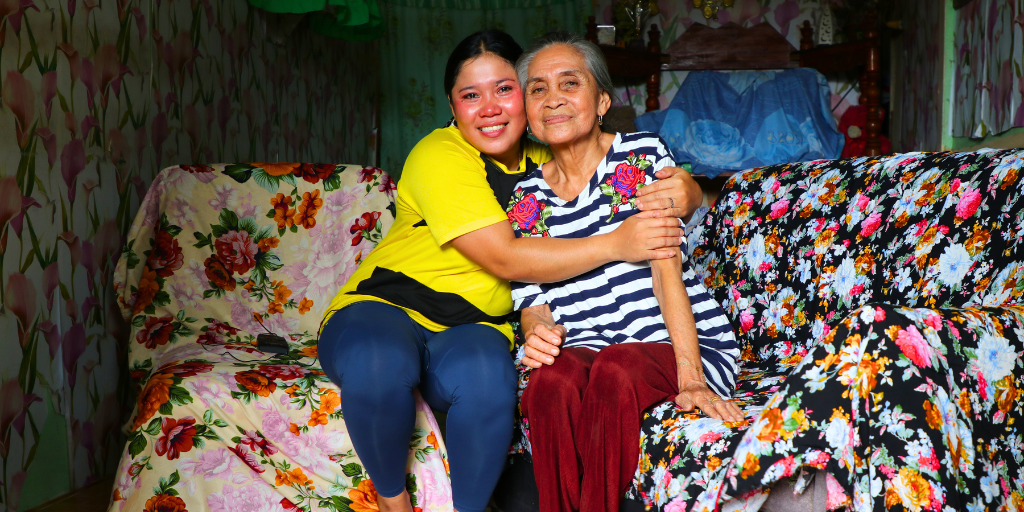
Katy Burns Mallow tells the story of an elderly woman in the Philippines who has found creative ways to ensure a sustainable livelihood.
Throughout her 76 years of life, Susan has been known by many titles.
As the eldest child of 10 siblings born to a fisherman, she was a baker at a shop after her father passed away, helping her mother generate enough income to care for the family.
After her mother passed, she was a candlemaker in a factory so she could better support her siblings’ studies. When she met her husband she was a food vendor, selling her products on the streets in the Philippines.
Lately, she earns income as part owner of a small variety store with her daughter and rents out two rooms she wisely built onto her home with savings from her Unbound sponsorship funds. As someone who has grown up in poverty, Susan is nothing if not resourceful in her ability to create a sustainable livelihood.
But the one title so deeply embedded into her identity that it could be considered her heart and soul is midwife.
For 54 years, the children in her community have called her ‘Nanay.’

Midwives are mother-centric figures in communities lacking access to medical care
In the Tagalog language of the Philippines, “nanay” means “mother” or “mommy.”
Besides being a term of endearment used for one’s mother, the word is often also used as a tribute to, or expression of love and respect for, a maternal figure.
Such is the case in Susan’s community where women, their children and grandchildren have been touched at some point by the elder’s respectful, compassionate and attentive care of expecting mothers.
Since she delivered her first child in 1968, Susan has assisted the births of more than 200 babies in her community. Over the decades, as those babies have grown into adults, she’s eventually delivered their babies as well.
“I feel very happy seeing them [the children] when they see me outside,” said Susan, who fondly keeps an album of polaroid photos of the babies she’s helped birth. “They do bless me as their sign of respect [placing their hand on her forehead].”

Having a midwife like Susan in a marginalized rural community is more than a comfort to expecting mothers — her presence can also be a lifeline.
As the only midwife in her community, Susan not only aids with births but also provides medications, along with services such as therapeutic massage for expecting mothers and assistance with birth certificates.
Following a birth, she also schedules postnatal check-ups at the nearest “lying-in clinic,” a more affordable health facility outside of a hospital that’s equipped with birthing and recovery rooms and operated by other health professionals.
Though Susan initially learned midwifery skills from her grandfather who helped deliver the babies of indigenous women of the Igorot tribe in the Philippines, she received additional training from a doctor at a lying-in clinic where she worked for 18 years.
Distance to the nearest clinic is often a problem for mothers who’ve gone into labor — especially for those with no access to reliable transportation — but many choose Susan to be their midwife because her services are more affordable than a hospital, and she is attentive to their needs.
“Many are afraid to go to the hospital,” Susan said. “But whether they have money or not, I will help them deliver their baby safely.”

The elder a community knows as "Mother"
Susan is often assisted in her midwife services by her daughter, Mary Jane, 34.
Mary Jane and her three children share a home with Susan and her husband, Mary Jane’s father, Sarmiento. Though Mary Jane worries about the physical toll that practicing as a midwife takes on her mother, she understands why expectant mothers seek out Susan’s services, especially since her mother delivered all three of her children.
“Giving birth at home, there is this person who will care for you, looking out for you, massaging your back and arms,” Mary Jane said. “I feel more comfortable and secure.”
Susan’s neighbor Jenebe describes the elder midwife as “like her doctor.” Susan has delivered all three of Jenebe’s children. Jenebe’s family couldn’t afford a hospital stay but the distance to the hospital was also a factor for the 27-year-old whose husband works abroad.
“I have my trust in Nanay Susan because she has helped a lot of women,” Jenebe said. “She comforts your pain and talks to you about what to do. If ever I have a fourth child, I still choose her to help with my delivery.”
It could be said that Susan’s days begin and end with her love for children.
Each morning, she sits outside her home, taking in the fresh air while watching the children in the community — many of whom she helped come into the world — as they play, and sometimes she plays with them.
Share your thoughts with the Catholic Mom community! You'll find the comment box below the author's bio and list of recommended articles.
Copyright 2024 Katy Burns Mallow for Unbound, with assistance from Unbound regional reporter Teejay Cabrera
Images: copyright 2024 Unbound/Teejay Cabrera, all rights reserved.
About the Author

Unbound
Unbound is an international nonprofit founded by lay Catholics grounded in the Gospel call to put the needs of the marginalized and vulnerable first. We build relationships of mutual respect and support that bridge cultural, religious and economic divides. We bring people together to challenge poverty in Africa, Asia, and Latin America. We invite you to join us. Find us on Facebook, Instagram, and YouTube.


.png?width=1806&height=731&name=CatholicMom_hcfm_logo1_pos_871c_2728c%20(002).png)
Comments